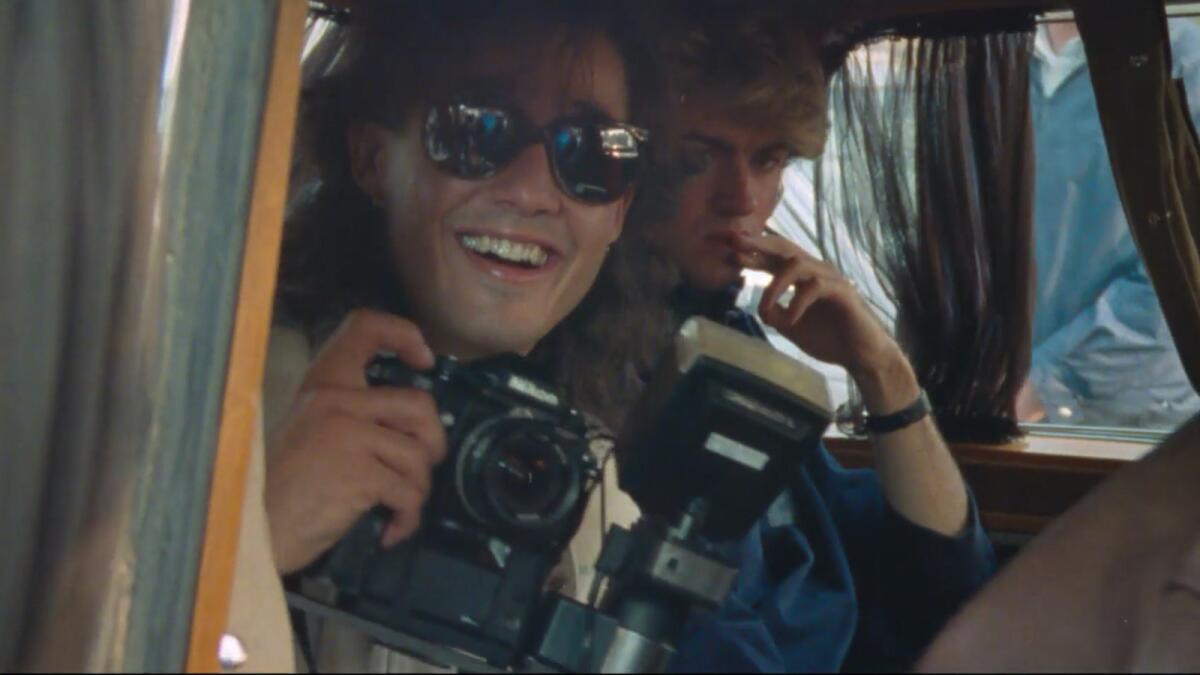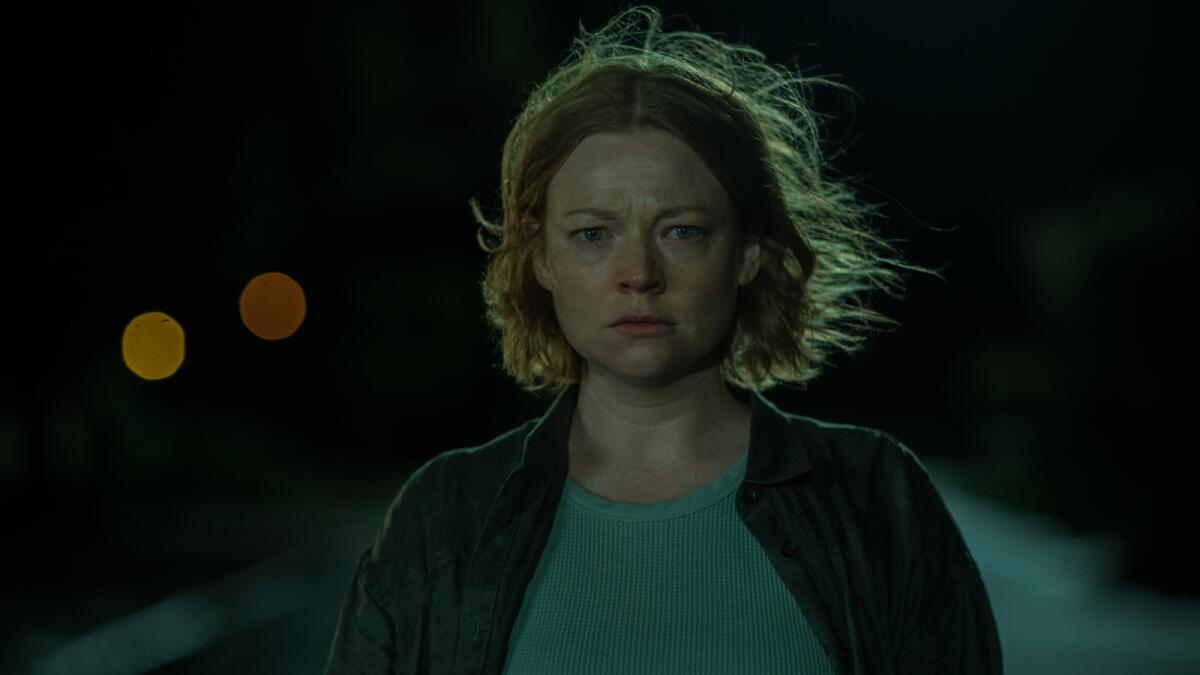Review: Relive the whirlwind that was ‘Wham!’ from the inside out

- Share via
‘Wham!’
Pop music had one of its all-time best years in 1984, when Prince, Van Halen, Cyndi Lauper, Tina Turner and Madonna all topped the Billboard singles charts. Then, as the year came to an end, a U.K. import cracked U.S. radio: the well-coiffed, white-teethed, infectiously bubbly duo Wham!, with its throwback blue-eyed soul hit “Wake Me Up Before You Go-Go.” The band notched a few more stateside hits — “Careless Whisper,” “I’m Your Man” and others — before lead singer and songwriter George Michael went solo, became a superstar and died young.
For those who were immersed in the 1980s U.K. pop scene, Chris Smith’s documentary “Wham!” likely won’t tell you much you didn’t already know. Michael and his musical partner Andrew Ridgeley were huge overseas before they made it here, and they were covered far more extensively in the U.K. press than in the U.S., where the serious rock magazines mostly treated Wham! as lightweights — while the mainstream media just asked the two about groupies and hairstyles. “Wham!” might be a revelation, though, to latecomer fans, because there is such a wealth of audio and video for Smith to draw on — enough that Michael’s insights are as significant in the film as Ridgeley’s.
The prominence of those two voices in this documentary matters because Wham!’s success was such a whirlwind — and generated so many disparate opinions from pundits — that it’s refreshing to hear the more grounded perspective of the two guys at the center of it all.
Three main themes emerge: That Michael worked harder at his craft than many recognized at the time; that the pop idol industry wasn’t going to give Michael the freedom to explore and express his homosexuality; and that Ridgeley was a prince of a guy, who supported his friend even when it meant breaking up the band.
Even beyond the lessons learned though, “Wham!” is a treat for fans of ’80s culture. There haven’t been as many eras so filled with big personalities producing enduring work. Wham! walked among those giants, matching them stride for stride.
‘Wham!.’ TV-MA, for language, nudity and smoking. 1 hour, 32 minutes. Available on Netflix; also playing theatrically, Bay Theater, Pacific Palisades
A new Netflix doc delves into the meteoric, athleisure-wearing careers of Andrew Ridgeley and the late George Michael, better known as ‘80s pop stars Wham!

‘Run Rabbit Run’
Sarah Snook gives a riveting performance as a mother going mad in “Run Rabbit Run,” a psychological thriller that’s mostly effective, even though its story is familiar and somewhat threadbare. Snook plays Sarah, a divorced woman coping with a confluence of personal problems: her father has just died, leaving her to sort through his belongings and reckon with some bad memories; her mother (Greta Scacchi) has been hospitalized with dementia; and her daughter, Mia (Lily LaTorre), is at an age where she’s sometimes stubbornly defiant for no real reason. Sarah’s frustration with Mia explodes into a full-on breakdown when the kid starts insisting she is actually “Alice,” the sister who went missing when Sarah was a child.
Director Daina Reid and screenwriter Hannah Kent invest a lot of their narrative stakes on the Alice mystery — both what happened to her and why Sarah is hesitant to talk about it. The problem with this approach is that it’s more about gradually piecing together the past than it is about what the characters are doing now.
In the present day, everyone tiptoes around touchy topics, trying to avoid grappling with the problems right in front of them. (It doesn’t help that this movie’s visual design is dim and drab, making the conflicts feel all the more hazy and distant.)
Still, even without much material to work with, Snook builds a dynamic character: a woman who already felt isolated from her family even before Mia started shutting her out too. Is her daughter really possessed by Alice’s spirit, or is she just messing with her mother’s head out of pure cussedness? The effect on Sarah is the same either way: It’s a sense of her current reality being consumed by a tragedy she has tried all her life to forget.
‘Run Rabbit Run.’ TV-MA, for language and smoking. 1 hour, 40 minutes. Available on Netflix
‘Bad Girl Boogey’
Teenage Australian filmmaker Alice Maio Mackay has a budding talent and a lot of enthusiasm, which partly makes up for the occasional incoherence of her slasher picture “Bad Girl Boogey” (co-written with Ben Pahl Robinson).
The movie is ostensibly about a haunted mask that transforms its wearers into psychopathic killers who act on deep-seated hatreds, mostly against queer people. The disjointed story is set across multiple eras; but it’s centered on Angel (Lisa Fanto), a teenager whose life has been disrupted multiple times by these masked killers but who is now getting proactive and tracking down the latest monster with the help of friends and allies.
Mackay breaks often for musical interludes and impressionistic montages, which slow the narrative momentum and make the plot harder to follow.
Otherwise, though, the slasher elements in “Bad Girl Boogey” are handled well, with some impressive gore effects. Plus, the horror has a purpose, beyond gamy genre thrills. This movie is perhaps best described as a clunky but endearingly heartfelt DIY depiction of life among a group of LGBTQ+ kids, striving to live joyfully while being plagued by evil forces, anxious to eradicate them.
‘Bad Girl Boogey.’ Not rated. 1 hour, 20 minutes. Available on VOD
Available now on DVD and Blu-ray
“The Truman Show” alarmed and delighted critics and audiences back in 1998 with its pointedly satirical story about a kindly everyman (played by Jim Carrey) whose entire life has been secretly broadcast on television to a nation of voracious voyeurs. The new 25th anniversary Blu-ray edition adds a lengthy look at how director Peter Weir made a movie that seems as relevant now as it did then. Paramount
More to Read
Only good movies
Get the Indie Focus newsletter, Mark Olsen's weekly guide to the world of cinema.
You may occasionally receive promotional content from the Los Angeles Times.











